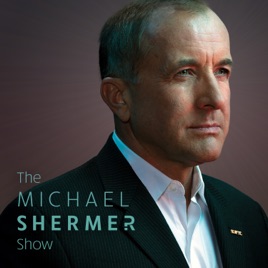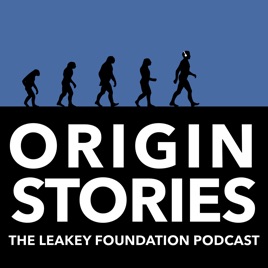
Advertise on podcast: The Michael Shermer Show
Rating
4.5 from
Country
This podcast has
415 episodes
Language
Publisher
Explicit
No
Date created
2018/02/26
Average duration
90 min.
Release period
5 days
Description
The Michael Shermer Show is a series of long-form conversations between Dr. Michael Shermer and leading scientists, philosophers, historians, scholars, writers and thinkers about the most important issues of our time.
Social media
Check The Michael Shermer Show social media presence
Podcast episodes
Check latest episodes from The Michael Shermer Show podcast
China's Grip on Rare-Earth Elements and the Future of Global Energy Security
2024/02/24
To build electric vehicles, solar panels, cell phones, and millions of other devices means the world must dig more mines to extract lithium, copper, and other vital building blocks. But mines are deeply unpopular, even as they have a role to play in fighting climate change and powering crucial technologies.
Shermer and Scheyder discuss: • How much rare earth metals will we need by 2050, 2100, and beyond? • How do lithium-ion batteries work compared to lead-acid? What are the alternatives? • Will EVs completely replace all other cars? • Can renewables completely replace fossil fuels without nuclear? • How mining works in the U.S., China, Chile, Russia, elsewhere.
Ernest Scheyder is a senior correspondent for Reuters, covering the green energy transition and the minerals that undergird it. He previously covered the US shale oil revolution, politics, and the environment at the Associated Press.
more
mRNA Vaccines, Mask Mandates, and the COVID-19 Response (Paul Offit)
2024/02/20
As a member of the FDA Vaccine Advisory Committee and a former member of the Advisory Committee for Immunization Practices to the CDC, Dr. Paul Offit has been in the room for the creation of policies that have affected hundreds of millions of people.
Four years after the outbreak of COVID-19, he reflects on our response to the pandemic: what went well and what didn't.
Shermer and Offit discuss: mRNA vaccines • loss of trust in medical and scientific institutions • overall assessment of what went right and wrong • mandates vs. recommendations • economic costs • lab leak hypothesis vs. zoonomic hypothesis • debating anti-vaxxers • treatments • high risk vs. low risk groups
Paul Offit is the Director of the Vaccine Education Center at the Children’s Hospital of Philadelphia and Professor of Vaccinology and Professor of Pediatrics at the University of Pennsylvania. Offit has published more than 170 papers in medical and scientific journals in the areas of rotavirus-specific immune responses and vaccine safety. He is also the co-inventor of the rotavirus vaccine, RotaTeq, recommended for universal use in infants by the CDC and WHO.
more
Foster Care, Family, and Social Class
2024/02/17
Rob Henderson was born to a drug-addicted mother and a father he never met, ultimately shuttling between ten different foster homes in California. When he was adopted into a loving family, he hoped that life would finally be stable and safe. Divorce, tragedy, poverty, and violence marked his adolescent and teen years, propelling Henderson to join the military upon completing high school.
His greatest achievements — a military career, an undergraduate education from Yale, a PhD from Cambridge — feel like hollow measures of success. He argues that stability at home is more important than external accomplishments, and he illustrates the ways the most privileged among us benefit from a set of social standards that actively harm the most vulnerable.
Shermer and Henderson discuss: hindsight bias • genes, environment, luck, contingency • foster care • incarceration rates • marriage, divorce, childhood outcomes • poverty, welfare programs, and social safety nets • the young male syndrome • alcohol, drugs, depression • luxury beliefs of educated elites • wealthy but unstable homes vs. low-income but stable homes • inequality • Henderon's experience in the military, at Yale and Cambridge • the Warrior-Scholar Project.
Rob Henderson grew up in foster homes in Los Angeles and the rural town of Red Bluff, California. He joined the US Air Force at the age of seventeen. Once described as “self-made” by the New York Times, Rob subsequently received a BS from Yale University and a PhD in psychology from St. Catharine’s College, Cambridge. His writing has appeared in the New York Times, Wall Street Journal, Boston Globe, and more. His weekly newsletter is sent to more than forty thousand subscribers. Learn more at RobKHenderson.com. His new book is Troubled: A Memoir of Foster Care, Family, and Social Class.
more
How US Public Health Has Strayed From Its Liberal Roots
2024/02/13
The Covid-19 response was a crucible of politics and public health—a volatile combination that produced predictably bad results. As scientific expertise became entangled with political motivations, the public-health establishment found itself mired in political encampment.
It was, as Sandro Galea argues, a crisis of liberalism: a retreat from the principles of free speech, open debate, and the pursuit of knowledge through reasoned inquiry that should inform the work of public health.
Across fifty essays, Within Reason chronicles how public health became enmeshed in the insidious social trends that accelerated under Covid-19. Galea challenges this intellectual drift towards intolerance and absolutism while showing how similar regressions from reason undermined social progress during earlier eras. Within Reason builds an incisive case for a return to critical, open inquiry as a guiding principle for the future public health we want—and a future we must work to protect.
Dr. Sandro Galea is a physician, epidemiologist, author and the Robert A. Knox Professor at Boston University School of Public Health. He previously held academic and leadership positions at Columbia University, the University of Michigan, and the New York Academy of Medicine. He has published more than 1000 scientific journal articles, 75 chapters, and 24 books, and his research has been featured extensively in current periodicals and newspapers. Galea holds a medical degree from the University of Toronto and graduate degrees from Harvard University and Columbia University. Dr. Galea was named one of Time magazine’s epidemiology innovators and has been listed as one of the “World’s Most Influential Scientific Minds.” He is past chair of the board of the Association of Schools and Programs of Public Health and past president of the Society for Epidemiologic Research and of the Interdisciplinary Association for Population Health Science. He is an elected member of the National Academy of Medicine and the American Epidemiological Society. He is the author of The Contagion Next Time and Well: What We Need to Talk About When We Talk About Health. His new book is Within Reason: A Liberal Public Health for an Illiberal Time.
more
Against the New Politics of Identity
2024/02/10
In Against the New Politics of Identity, philosopher Ronald A. Lindsay offers a sustained criticism of the far-reaching cultural transformation occurring across much of the West by which individuals are defined primarily by their group identity, such as race, ethnicity, gender identity, and sexual orientation. Driven largely by the political Left, this transformation has led to the wholesale grouping of individuals into oppressed and oppressor classes in both theory and practice. He warns that the push for identity politics on the Left predictably elicits a parallel reaction from the Right, including the Right’s own version of identity politics in the form of Christian nationalism. As Lindsay makes clear, the symbiotic relationship that has formed between these two political poles risks producing even deeper threats to Enlightenment values and Western democracy. If we are to preserve a liberal democracy in which the rights of individuals are respected, he concludes, the dogmas of identity politics must be challenged and refuted. Against the New Politics of Identity offers a principled path for doing so.
Shermer and Lindsay discuss: identity politics: identity or politics? • woke ideology • overt racism vs. systemic racism • liberalism vs. illiberalism • woke progressive leftists motivations? • Critical Race Theory (CRT) • Diversity, Equity and Inclusion (DEI) • What is progressive? What is woke? • standpoint epistemology • equality vs. equity • race • class • cancel culture • Christian nationalism.
Dr. Ronald Lindsay, a philosopher (PhD, Georgetown University) and lawyer (JD, University of Virginia) is the author of The Necessity of Secularism and Future Bioethics. Although his non-fiction works focus on different topics, two threads unite them: Lindsay’s gift for thinking critically about accepted narratives and his strong commitment to individual rights, whether it’s the right to assisted dying, the right to religious freedom, or the right of individuals to be judged on their own merit, as opposed to their group identity. In addition to his books, Lindsay has also written numerous philosophical and legal essays, including the entry on Euthanasia in the International Encyclopedia of Ethics. In his spare time, Lindsay plays baseball—baseball, not softball. The good news is he maintains a batting average near .300; the bad news is his fielding average is not much higher. A native of Boston, Ron Lindsay currently lives in Loudoun County, Virginia with his wife, Debra, where their presence is usually tolerated by their cat. His new book is: Against the New Politics of Identity: How the Left’s Dogmas on Race and Equity Harm Liberal Democracy and Invigorate Christian Nationalism.
more
What Determines Who Succeeds in the NBA?
2024/02/06
Former Google data scientist and bestselling author of Everybody Lies Seth Stephens-Davidowitz turns his analytic skills to the NBA.
Shermer and Stephens-Davidowitz discuss: why some countries produce so many more NBA players than others • the greatest NBA players adjusted for height • why tall NBA players are worse athletes than short NBA players • How much do NBA coaches matter and what do they do? • In a population of 8 billion today compared to centuries past, where are all the Mozarts, Beethovens, Da Vincis, Newtons, Darwins, etc.?
Seth Stephens-Davidowitz is a contributing op-ed writer for the New York Times, a lecturer at The Wharton School, and a former Google data scientist. He received a BA from Stanford and a PhD from Harvard. He is the author of Everybody Lies: Big Data, New Data, and What the Internet Can Tell Us About Who We Really Are and Don’t Trust Your Gut: Using Data to Get What You Really Want in Life.
more
Transforming Mental Health: Little Treatments, Big Effects
2024/02/03
If you’ve ever wanted mental health support but haven’t been able to get it, you are not alone.
In fact, you’re part of the more than 50% of adults and more than 75% of young people worldwide with unmet psychological needs. Maybe you’ve faced months-long waiting lists, or you’re not sure if your problems are ‘bad enough’ to merit treatment? Maybe you tried therapy but stopped due to costs or time constraints? Perhaps you just don’t know where to start looking? The fact is, there are infinite reasons why mental health treatment is hard to get. There’s an urgent need for new ideas and pathways to help people heal.
Little Treatments, Big Effects integrates cutting-edge psychological science, lived experience narratives and practical self-help activities to introduce a new type of therapeutic experience to audiences worldwide: single-session interventions. Its chapters unpack why systemic change in mental healthcare is necessary; the science behind how single-session interventions make it possible; how others have created ‘meaningful moments’ in their recovery journeys (and how you can, too); and how single-session interventions could transform the mental healthcare system into one that’s accessible to all.
Shermer and Schleider discuss: her own experience with mental illness and eating disorder • 80% of people meet criteria for a mental illness at some point in their life • the goal of therapy • navigating therapy modalities, access, payments, insurance • What prevents people from getting the mental health help they need? • outcome measures to test different therapies • traditional therapy vs. single-session interventions • growth mindset • Cognitive Behavior Therapy (CBT) • difference between goals and values • how action brings change.
Jessica L. Schleider, Ph.D. is an American psychologist, author, and an associate professor of Medical Social Sciences at Northwestern University. She is the lab director of the Lab for Scalable Mental Health. She completed her PhD in Clinical Psychology at Harvard University and her Doctoral Internship in Clinical and Community Psychology at Yale School of Medicine. She has received numerous scientific awards for her work in this area and her work is frequently featured in major media outlets (Wall Street Journal, The Atlantic, Washington Post). In 2020, she was selected as one of Forbes Magazine’s ‘30 Under 30’ in Healthcare. She has developed six evidence-based, single-session mental health programmes, which have served more than 40,000 people to date. She is the author of The Growth Mindset Workbook for Teens and co-editor of the Oxford Guide to Brief and Low Intensity Interventions for Children and Young People. Her new book is Little Treatments, Big Effects: How to Build Meaningful Moments That Can Transform Your Mental Health.
more
Overcoming Self-Censorship in the Age of Outrage
2024/01/30
As a society we are self-censoring at record rates. Say the wrong thing at the wrong moment to the wrong person and the consequences can be dire.
Think that everyone should be treated equally regardless of race? You’re a racist. Argue that people should be able to speak freely within the bounds of the law? You’re a fascist.
When the truth is no defense and nuance is seen as an attack, self-censorship is a rational choice. Yet, when we are too fearful to speak openly and honestly, we deprive ourselves of the ability to build genuine relationships, we yield all cultural and political power to those with opposing views, and we lose our ability to challenge ideas or change minds, even our own.
Katherine Brodsky argues that it’s time for principled individuals to hit the unmute button and resist the authoritarians among us who name, shame, and punish.
Shermer and Brodsky discuss: growing up Jewish in the Soviet Union and Israel • why liberals (or progressives) no longer defend free speech • cancel culture: data and anecdotes and whether it is an imagined moral panic • free speech law vs. free speech norms • solutions to cancel culture • identity politics • witch crazes and virtue signaling • hate speech and slippery slopes • how to stand up to cancel culture.
Katherine Brodsky is a journalist and author. She has contributed to publications such as Variety, the Washington Post, WIRED, The Guardian, and many others. Over the years she has interviewed a diverse range of intriguing personalities, including the Dalai Lama.
more
One Couple’s Vacation Caused 100,000 People to Die
2024/01/27
If you could rewind your life to the very beginning and then press play, would everything turn out the same? Or could making an accidental phone call or missing an exit off the highway change not just your life, but history itself?
How did one couple’s vacation cause 100,000 people to die?
Brian Klaas explores how our world really works, driven by strange interactions and apparently random events. Drawing on social science, chaos theory, history, evolutionary biology, and philosophy, he provides a fresh look at why things happen.
Brian Klaas is a professor of global politics at University College London. He is a regular contributor for The Washington Post and The Atlantic, host of the award-winning Power Corrupts podcast. His new book is Fluke: Chance, Chaos and Why Everything We Do Matters. You can find him at BrianPKlaas.com and on Twitter @brianklaas.
more
Head of TED Talks Shares a New Vision of Generosity
2024/01/23
As head of TED, Chris Anderson has had a ringside view of the world’s boldest thinkers sharing their most uplifting ideas. Inspired by them, he believes that it’s within our grasp to turn outrage back into optimism. It all comes down to reimagining one of the most fundamental human virtues: generosity. What if generosity could become infectious generosity?
Chris offers a playbook for how to embark on our own generous acts—whether gifts of money, time, talent, connection, or kindness—and to prime them, thanks to the Internet, to have self-replicating, even world-changing, impact.
Shermer and Anderson discuss: what makes TED successful • power laws and giving • charging vs. giving away • altruism • being good without God • billionaires • how the average person can participate • public vs. private solutions to social problems • donor fatigue.
Chris Anderson has been the curator of TED since 2001. He holds a degree in philosophy, politics and economics from Oxford University. His new book is Infectious Generosity: The Ultimate Idea Worth Spreading.
more
Are Parallel Universes and Extra Dimensions Real?
2024/01/17
Our books, our movies—our imaginations—are obsessed with extra dimensions, alternate timelines, and the sense that all we see might not be all there is. In short, we can’t stop thinking about the multiverse. As it turns out, physicists are similarly captivated.
In The Allure of the Multiverse, physicist Paul Halpern tells the epic story of how science became besotted with the multiverse, and the controversies that ensued. The questions that brought scientists to this point are big and deep: Is reality such that anything can happen, must happen? How does quantum mechanics “choose” the outcomes of its apparently random processes? And why is the universe habitable? Each question quickly leads to the multiverse. Drawing on centuries of disputation and deep vision, from luminaries like Nietzsche, Einstein, and the creators of the Marvel Cinematic Universe, Halpern reveals the multiplicity of multiverses that scientists have imagined to make sense of our reality. Whether we live in one of many different possible universes, or simply the only one there is, might never be certain. But Halpern shows one thing for sure: how stimulating it can be to try to find out.
Shermer and Halpern discuss: definitions of universe and types of multiverses • Is the multiverse science, metaphysics, or faith? • theists claim the “multiverse” is just handwaving around the God answer • many worlds interpretation of quantum mechanics? • inflationary and Darwinian cosmology • infinity and eternity • multiple dimensions • string theory • cyclical universes • Big Bounce • Anthropic Principle (weak, strong, participatory) • time travel • sliding doors, contingency, and the multiverse.
Dr. Paul Halpern is the author of 18 popular science books, exploring the subjects of space, time, higher dimensions, dark energy, dark matter, exoplanets, particle physics, and cosmology. The recipient of a Guggenheim Fellowship, a Fulbright Scholarship, and an Athenaeum Literary Award, he has contributed to Nature, Physics Today, Aeon, NOVA’s “The Nature of Reality” physics blog, and Forbes “Starts with a Bang!” He has appeared on numerous radio and television shows including “Future Quest,” “Science Friday,” “Radio Times,” “Coast to Coast AM,” “The Simpsons 20thAnniversary Special,” and C-SPAN’s “BookTV.” He appeared previously on the show for his book Synchronicity: The Epic Quest to Understand the Quantum Nature of Cause and Effect. His new book, The Allure of the Multiverse, describes the controversial history of higher dimensional and parallel universe schemes in science and culture.
more
Michael Shellenberger Explains Government Censorship of Social Media
2024/01/09
Michael Shellenberger explains the role of government agencies in social media censorship, his work on the Twitter files, and the differences between independent and mainstream journalism. PLUS: how to deal with the opioid epidemic, what we can do about homelessness, his take on January 6, George Floyd, UFOs and UAPs, and more. Recorded live in Santa Barbara, CA at the Skeptics Society 2023 conference.
more
Podcast reviews
Read The Michael Shermer Show podcast reviews
terminalwillness
2023/11/30
Good but
I really enjoy the podcast and the wide range of topics it covers but Shermer doesn’t push back on many of his guests like he should.
luciferian5D
2024/02/10
intellectual dark web
Since when did shermer start dumping for jordan paterson ??
anyway unfollowing now -peace
nattyvask
2024/01/23
A little productive info
Love the podcast it’s a great way to hear new ideas , the current interview with the Ted talk curator is great. Just a little info Charity navigator ...
more
MGThill
2024/01/21
Steven Myers
Loved the show with Stephen Myers!
Such a great discussion on intelligent design!!!
dpickett
2023/12/27
Woke madness?
Always on the lookout for good, rigorous skeptic content. Unfortunately, my first episode of this show had the guest talking about "woke madness" with...
more
Mike797979
2023/12/08
Meh
Dude tries but ultimately he’s painfully out of touch. Likes to offer up “funny stories” at inopportune moments, and regularly displays his lack of kn...
more
Crab Hamlin
2023/09/12
Germs
Sherm murmurs.
Hoaxter23
2023/11/29
Shermer is a dishonest professional debunker
Shermer says, “As scientists, we have to be open-minded.” What a joke! Shermer is neither a scientist nor open-minded. He has degrees in psychology an...
more
LobePDX
2023/10/11
Skeptical about Conservative values…
It is unfortunate. The guests Mr Shermer has on his podcast are some of the most interesting writers and thinkers in America, but he seems to mostly ...
more
Spaulding67
2023/09/01
Blah
As smart as he is Shermer is an egotistical know-it-all, and remains a great man only in his own mind. Through the years I have found him to be lacklu...
more
Podcast sponsorship advertising
Start advertising on The Michael Shermer Show & sponsor relevant audience podcasts
You may also like these natural sciences Podcasts

4.6
110
114
The Aquarium Guys
Aquarium Guys Studios

5
4
26
Backyard Geology
TravelingGeologist

4.8
450
410
All Creatures Podcast
All Creatures Podcast

4.9
75
99
Snake Talk
Dr. Chris Jenkins

4.9
409
78
Origin Stories
The Leakey Foundation

4.9
41
59
Cutting Carbon
GE Gas Power

4.1
1590
27
Seven: Disturbing Chronicle Stories of Scary, Paranormal & Horror Tales
Seven: A Disturbing Stories Chronicle of Scary, Paranormal & Horror Tales

5
183
142
Quantitude
Greg Hancock & Patrick Curran

5
35
54
Night Science
Itai Yanai & Martin Lercher

4.3
126
754
Untold Radio Network
Untold Radio Network



